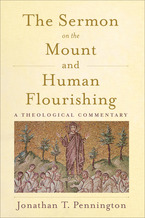Pennington, Jonathan. The Sermon on the Mount and Human Flourishing: A Theological Commentary. Grand Rapids: Baker, 2017.
 Pennington’s commentary on the Sermon on the Mount comes in the three parts. The first, which he terms “Orientation” provides a discussions of the Sermon’s structure as well as of key terms and concepts: makarios (typically translated “blessed”), teleios (typically translated “perfect”), righteousness, hypocrisy, heart, Gentiles, the Father in heaven, the kingdom, and reward. In this section Pennington also argues that the larger context for the Sermon is the Hebrew wisdom tradition and the Greek virtue ethics tradition.
Pennington’s commentary on the Sermon on the Mount comes in the three parts. The first, which he terms “Orientation” provides a discussions of the Sermon’s structure as well as of key terms and concepts: makarios (typically translated “blessed”), teleios (typically translated “perfect”), righteousness, hypocrisy, heart, Gentiles, the Father in heaven, the kingdom, and reward. In this section Pennington also argues that the larger context for the Sermon is the Hebrew wisdom tradition and the Greek virtue ethics tradition.
The second part of Pennington’s book is the commentary proper. This is a brief section, by section commentary of the entire sermon.
The third part of the commentary is a concluding chapter which summarizes the book’s argument in six theses:
Thesis 1: The Bible Is about Human Flourishing
Thesis 2: The Bible’s Vision of Human Flourishing Is God Centered and Eschatological
Thesis 3: The Moral View of the Bible Is a Revelatory Virtue Ethic
Thesis 4: The Sermon Teaches That Salvation Is Inextricably Entailed with Discipleship/Virtuous Transformation
Thesis 5: Virtue and Grace Are Compatible, Not Opposites
Thesis 6: Biblical Human Flourishing Provides Crucial Insight into the Meaning and Shape of God’s Saving Work
This commentary intersected with several areas that I’ve been studying recently:
- I taught the Beatitudes in Sunday School this winter and spring
- I wrote a paper for this summer’s Bible Faculty Summit on how beatitude/human flourishing and God’s glory work together as man’s chief end
- John Frame’s comment in Doctrine of the Christian Life that the normative, situational, and existential perspectives on ethics that he argues Christians should have correspond to the deontological, teleological, and virtue approaches ethics, has led me to study virtue ethics.
I found convincing Pennington’s argument that makarois corresponds to the Hebrew ashre and that both refer to a state of flourishing that comes from being blessed. I also found persuasive his argument that teleios refers to wholeness of person (i.e., it affirms the need to obey the law as a whole person rather than just outwardly as the scribes and Pharisees) rather than to perfection as modern English-speakers understand the term. Pennington’s discussion of the Sermon’s structure was also well done.
As interested as I was in the possible connection between the Sermon and virtue ethics, I found that part of Pennington’s argument less convincing. That the Sermon and Greco-Roman virtue ethics cover an overlapping area is clear. But that Jesus was actually interacting with Greco-Roman philosophers seems a bit of stretch to me. It was also interesting to be reading this book while also reading Kavin Rowe’s book on Stoicism. Rowe argues against an encyclopedic approach to connecting philosophy with Christian throught. Pennington argues for a connection between the Sermon and Greco-Roman virtue ethics by virtue of its “encyclopedic context.” I wasn’t entirely sure if Pennington and Rowe were talking about the same thing by “encyclopedic,” but insofar as they were, I found Rowe more persuasive.
Another weakness is Pennington’s tendency at points to pit Reformation and Roman Catholic readings against each other. Pennington tended to favor the Catholic readings without any further comment on how those readings fit into larger systems of theology. More troubling, when I looked at Reformation and Post-Reformation writers like Thomas Watson, William Perkins, and even Martin Luther, I didn’t always see the opposition that Pennington is claiming existed. Since he tended to footnote the Catholic interpreters but not the Reformation ones, I wonder if there may have been a caricature of Reformation and Puritan authors at this point.
These criticisms aside, this is a helpful and largely correct approach to the Sermon on the Mount that I’ve benefited from reading.
